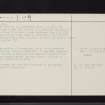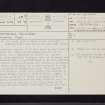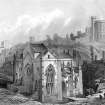Following the launch of trove.scot in February 2025 we are now planning the retiral of some of our webservices. Canmore will be switched off on 24th June 2025. Information about the closure can be found on the HES website: Retiral of HES web services | Historic Environment Scotland
Edinburgh, Paul's Work
Chapel (15th Century), Hospital (Period Unassigned)
Site Name Edinburgh, Paul's Work
Classification Chapel (15th Century), Hospital (Period Unassigned)
Alternative Name(s) Our Lady Hospital; North Back Of Canongate
Canmore ID 52533
Site Number NT27SE 68
NGR NT 2608 7393
Datum OSGB36 - NGR
Permalink http://canmore.org.uk/site/52533
- Council Edinburgh, City Of
- Parish Edinburgh (Edinburgh, City Of)
- Former Region Lothian
- Former District City Of Edinburgh
- Former County Midlothian
NT27SE 68 2608 7393.
(Name: NT 2608 7393) Site of (NAT) Paul's Work (NR) Formerly (NAT) Hospital of Our Lady (NR) (1479)
OS 1/1056 plan, (1854)
The medieval hospital of St Paul stood on the E side of Leith Wynd (RCAHMS 1951). There are divergent accounts of its foundation. It is described in 1469/70 as a poor's hospital which Archibald Crawford, abbot of Holyrood, had newly erected with a chapel dedicated to St Paul. However, a Town Council minute attributes its foundation to Thomas Spens, bishop of Aberdeen, as a poor's hospital in 1479. It has a variety of designations, eg. "the hospital of St Mary of St Paul" (1488, 1490, 1514); "the hospital of the Blessed Virgin, called St Paul's" (1501). Again, it is described as St Paul's "Werk" (building), which is specifically identified with Our Lady Hospital, e.g. in 1518 "the place or hospital of the Virgin Mary and St Paul called St Paul's Werk", and other similar mentions till 1608.
The hospital was apparently rebuilt in 1619, and developed in the 17th century as a workhouse or house of correction; it is said to have continued thus till 1750. The building of 1619, however, survived; in it, in 1805, Ballantyne established his press and there the Waverly Novels were printed.
RCAHMS 1951; D E Easson 1957.
The problem of foundation, and of the alternative dedications, remains unresolved. It has been suggested that originally there may have been two hospitals both using a common chapel, the Lady chapel in St Paul's hospital mentioned in 1495.
I B Cowan 1964.
No trace, the site being occupied by the railway. No further information.
Visited by OS (J L D) 29 December 1953.
REFERENCE:
Sources: Dean of Guild Bundle 1812 January-June 23.4.1812
Pet. John Dumbrech, coach maker
Paul's work - yard
Small building to be erected near centre of yard
Pland and elevation unsigned
Sources: Dean of Guild Bundle 1812 16.7.1812
Pet. Edward Savens, carter and John Bartly, Smith
Palls Work, bottom of
Major alterations
Plan and elevation, enclosed. Unsigned.
Publication Account (1951)
121. Hospital of St. Thomas, Watergate.
According to Maitland (1), who had evidently had access to the charter, this hospital was founded in 1541 by George Crichton, Bishop of Dunkeld and previously Abbot of Holyrood, for the maintenance of two chaplains and seven poor folk. In 1582 its patronage fell to the Crown through the forfeiture of Robert Crichton, another bishop of the same see. In 1617 the Privy Council decreed (2) that the "auld chappell" was to be repaired before the king's visit to Holyrood, as it was "decayit" and formed an eyesore in the close vicinity of the palace
RCAHMS 1951
(1) History, pp. 154 f. (2) R.P.C., xi, pp. 40 f.
Publication Account (1981)
A pre-Reformation hospital dedicated to St.Paul stood on the east side of Leith Wynd. Founded in 1469, it was used, first by General Leslie and then Cromwell after the battle of Dunbar, to house wounded soldiers. It retained its pauper inmates until 1750 when it was sold to the Charity Workhouse. During the seventeenth and eighteenth centuries, it was an almshouse, house of correction, training school for children and a textile factory (RCAM, 1951, 184).
Information from ‘Historic Edinburgh, Canongate and Leith: The Archaeological Implications of Development’ (1981).












